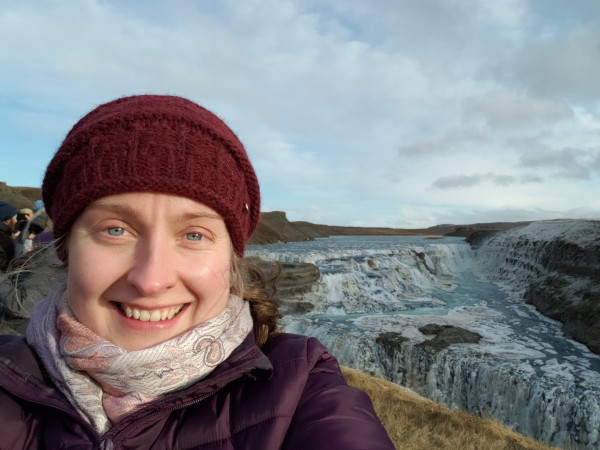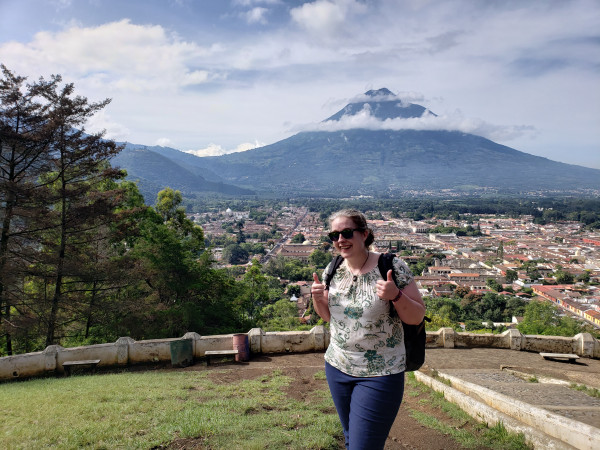Researcher profile: Jenny Stein
How do we get people to prepare for the inevitable?
Shakes, rumbles, slips, and floods: in New Zealand, we live in one of the most active landscapes in the world.
Most of us know this, and we know there are things we can do to prepare, but we don’t always follow through.
Why not? What motivates people to take more impactful action to prepare for natural hazard events? And how can we incorporate those insights into public education messaging and initiatives?
Answering these really difficult questions can boost New Zealand’s resilience to natural hazards as well as reduce the social, economic and psychological impact of these events.
PhD student Jenny Stein is working on these problems as part of a wider NHC-funded project to advance national and community-based public education for impactful change, led by Associate Professor Julia Becker at Massey University’s Joint Centre for Disaster Research.
It's a role Jenny is well-suited to and passionate about, coming from a background in science communication as well as geology.
Jenny took a break from her studies to answer a few questions about her research, as part of our monthly NHC Researcher Profile.
What do you like most about your work?
I enjoy the diversity. There’s no one-size-fits-all approach to promoting preparedness which makes it a huge a challenge. But when it works, those success stories, where people took appropriate actions and suffered less as a result, they show you that it’s worth putting in the time and effort to get communication and engagement right. I hope that if I do my job well, I’ll be able to help scientists, agencies, and community leaders better empower and inspire people to take preparedness actions, which will reduce those people’s chances of suffering property damage, injury or death during the next hazardous natural event. Consequently, this research has the potential to make a real difference to many people’s lifelong wellbeing, and that’s inspiring for me.
Why is it important to invest in natural hazards research like yours?
We can’t prevent natural hazards, but we can significantly reduce both their immediate impacts on people and property, and their lasting impacts on society and the economy by taking preparedness actions. Getting more people to take preparedness actions for natural hazards, even just at the household level, can have a cascading effect. When disaster strikes, instead of being someone who needs help, that person has a better chance of being able to take care of themselves, or even becoming someone who is able to help others. This frees up and possibly even contributes resources to the overall response and recovery process. Multiply this effect out to the scale of a community, or the whole country, and the social, financial and psychological impacts of disasters can be dramatically reduced, perhaps to the point where they are no longer disastrous.
What is your personal experience with natural disasters, and how has it influenced your research?
I am lucky to have not personally experienced a natural disaster (yet). I grew up with earthquakes but have never been in a damaging one, and I was too young to remember Cyclone Bola flooding my family’s property. Luckily our house was above the water level in that storm, but I grew up with photos of the flooded garden and my parents’ stories—especially one about how the water was cut-off for days but my family was ok because we had a huge rainwater tank, and every day one of the neighbours who had a young baby would come and take a bucketful of water home so she could wash nappies!
I think growing up with this acute awareness of natural processes and how having things in place to stop them causing unnecessary damage (we had all our ornaments blue-tacked down, which saved them from earthquakes numerous times), and to help us get by when they disrupt everyday life (like the rainwater tank when the water got cut-off), always made me interested in how the Earth works and how we need to find a balance between living where we want to live and coping with the occasionally undesirable consequences. It’s a combination of small-things-influence-the-big-picture and people-working-with-rather-than-against-nature approach that attracted me to this research and influences how am conducting it—particularly the need to remember that many people don’t have the same experiences or perspectives!
What are your ambitions for your research or career?
I am an opportunist who thrives on generating tangible outputs. So, I go where there are opportunities to learn something new and interesting and do some good. I have no particular career ambitions other than to keep doing this in whatever form seems best at the time (and pays the bills). So far, this approach has given me some amazing life experiences, and in a world that changes so rapidly and where so many things are uncertain, I think it will continue to be the best approach for me.
What does a resilient New Zealand look like to you?
For me a ‘Resilient New Zealand’ is one where people have learned to live with, not just on, their environments. It’s one where we have developed a culture of natural hazard awareness and preparedness that features in all relevant aspects of our lives, from everyday decisions around the house, to decisions about which house to buy (or not buy). Not in an intrusive or fearful way, but in an accepting, proactive one. Putting on a seatbelt is something most of us do automatically, without really thinking about why we’re doing it anymore. But the reality is we do it to reduce our chances of injury or death in a car accident. I think we need to approach natural hazards in a similar way, by acknowledging the risk, and having everyone take on the responsibility of doing something about it, for ourselves, and for everyone else who depends on us: our families, friends, colleagues and communities.
Do you have a favourite anecdote or memory related to your research?
I’m fortunate to have accumulated several great memories, even at this early stage of my research, but I would especially like to acknowledge my co-supervisor Distinguished Professor David Johnston, who recently passed away. He always used to say, “do good things, with good people, for good reasons” and I think this is something that should underpin all research, work, and life in general. It is something which I intend to do throughout this project and whatever comes after.
